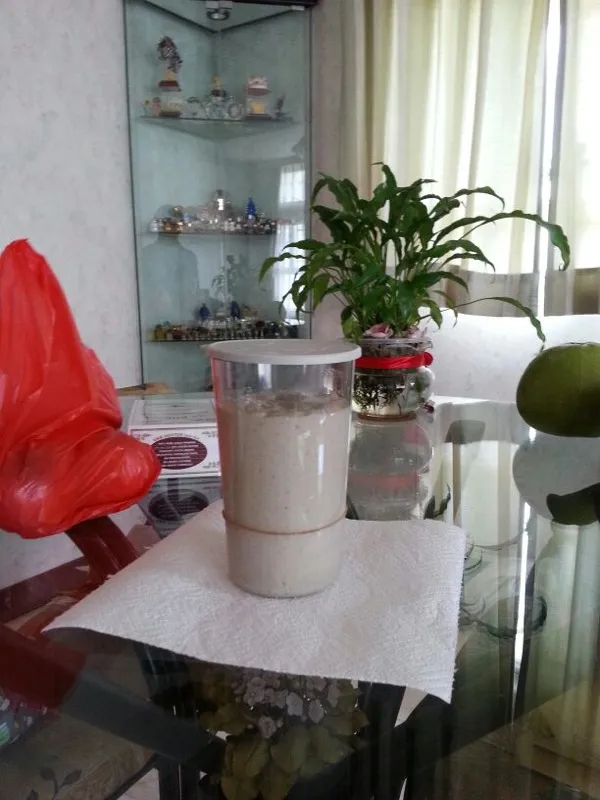
I fed the start at 9PM yesterday with 1:5:5 ratio it doubled and collapsed in 10 hours at around 32C
Then i fed it again this morning at 7am with 1:10:10 starter: Flour: Water ratio, it doubled (see Pic) in 7hours at over 33C, is my starter raising too quickly?
Once it doubled I have put it in the fridge wanting to use it on Saturday morning.
No I don't believe it is rising too quickly considering the high temperature of your room. In the summer our kitchen is around 22 to 24 C and winter it has a day time temperature of 19 C and night time 17 C and there is a noticeable difference in speed between winter and summer I would imagine if we had your temperatures it would speed it further.
Gerhard
Cecic,
Within certain limitations, the faster your starter can rise, the better! But, once a starter is established and active, you can totally control the rate at which it doubles, triples, or whatever. You have the power to manipulate your starter by feeding it either less, for a faster rise (and fall) or more, for a slower rise. Also, if you can manipulate temperature, you can change the speed at which it eats, multiplies, and rises. The cycle of rising and falling is basically the cycle of the yeasts eating, multiplying, then starting to run out of food. Feeding more at a time will cause them to have food for longer. And they will be more active at some temperatures than others, eating more in a warm climate, multiplying faster, eating faster (more 'mouths to feed' basically), and running out faster. I've read that some people have gotten their starter to quadruple in size in 4 hours! While that sounds like a very active starter (which it may be), it is more likely the combination of what they feed it, how much, how often, and how warm it is.
About refrigeration I have a couple of things. First, it may not be best to let it rise completely and then put it straight into the fridge. It will become less active, but it will still need food. Maybe, if it rises in 7 hours at room temp, you might want to put it into the fridge at 2 hours, instead of the 7th hour. That way it will have food to keep it alive in the fridge, and also to become active again after it comes back out of the fridge. Second, it may take a feeding or two to become as active again after you get it out, so you may want to take it out several hours early. That way, you can feed it as soon as it comes out, give it plenty of time to become active again, then use it for baking. It's probably not necessary to do this, but it might help you have better results. If you don't wait to let it peak before putting it into the fridge, then it might be more active after coming out, and not need as much time. All starters are different, so YMMV.
Thanks guys for your reply, I can finally take a breath as this rising speed has been bothering me.
Davidef your advice helps a lot, but I have a few things that I wanna clarify. How do I go about testing the starter to see if its active or not? Also I plan to use the starter on coming Saturday do I need to feed it again tomorrow night and let it rise overnight? And use it when it is peak?
thank you!
starter going to waste or is going to be baking a whole lot of bread :-) Active starters aren't the problem sluggish ones are? Much lower amounts, lower hydration and lower temperatures will help control that oozing mass!
CeciC,
When it is able to double in 12 hours or less, it is considered active. Usually, if it is room temperature, it can only be in two states: active or dead. But, the yeasts and LAB's practically hibernate at refrigerator temps, although technically they are still "active" just in a much slower way. If you have plenty of time on Saturday, you can mix it right into your recipe and wait for it to rise. You just won't know how long it takes until it does, that's all. Usually, it is recommended to get it going pretty well at room temperature before adding it to dough so that your rising times are more predictable, but really as long as it is alive it will eventually raise some dough. If you want to be sure, you can feed it Friday night and let it sit at room temp overnight, to bake Saturday, yes.
Your instructions are very nice and clear !
Im gonna feed it again tonight to make sure it's happily active before my Saturday baking
hopefully it wont give me a sour and dense dough like last time which half of it has gone into a bin ><
That's got my attention. What kind of tchotchkas do you collect?
They are miniature perfume bottles and some cartoon figures.
J Hamelman's book "Bread" includes some advice on regulating a starter's growth by adding a small amount of salt. Be sure to take a look at the subject.
Thank you
i think I better swing by library after work tonight